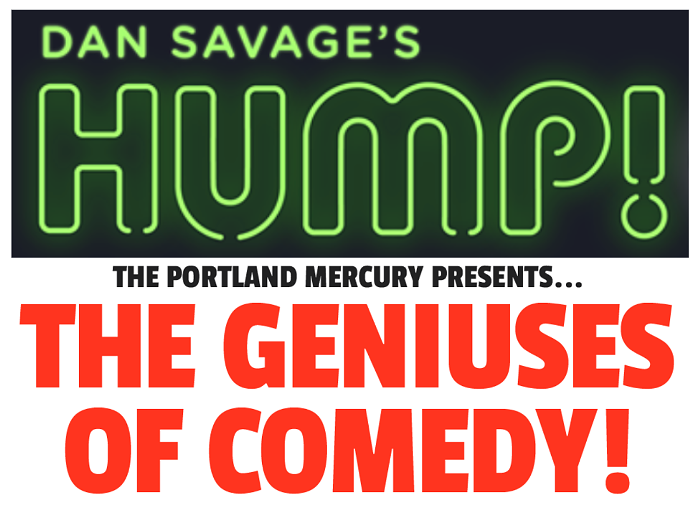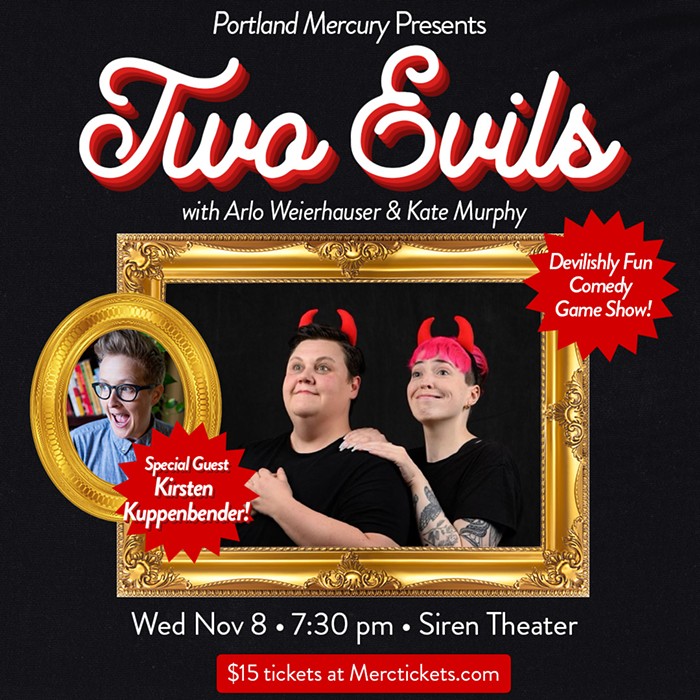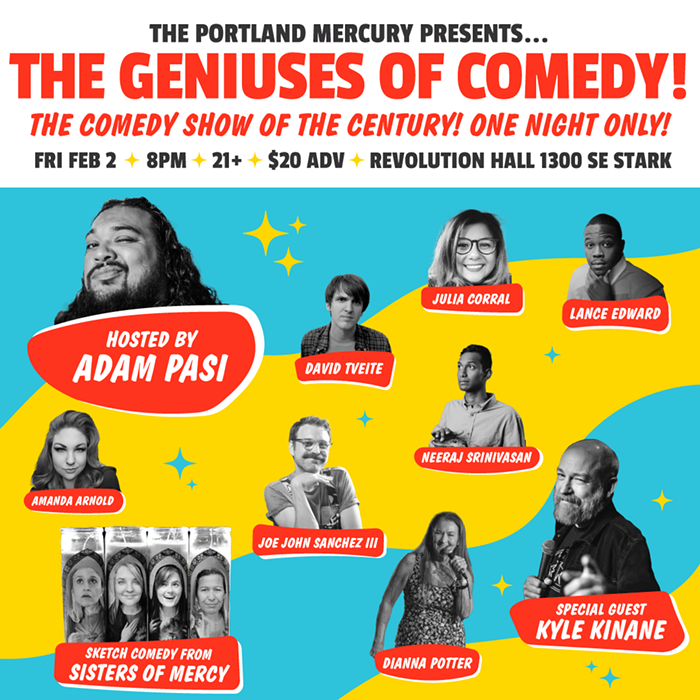By all accounts, the first Bridgetown Comedy Festival was a shaggy, hastily organized affair. Dreamed up over post-show drinks by then-local stand-up Andy Wood, fellow comic and former Portlander Matt Braunger, and comedy enthusiast and improviser Kimberly Brady in late 2007, the weekend-long event took over a small corner of SE Hawthorne with a lineup featuring a near-perfect combination of established talent (Patton Oswalt, Natasha Leggero, Kyle Kinane) and Portland up-and-comers (Ron Funches, Rylee Newton), all fueled by copious amounts of beer, booze, and friendly competition. The mixture was great for fans and performers alike: Comedy nerds got a solid sampler of local voices, and hometown stand-ups saw the pros in action.

Heather Christianson
Like all good success stories, things have progressed by leaps and bounds for Bridgetown since then. The annual event now spreads throughout the city, with themed showcases, podcast recordings, and smaller unofficial events. The lineup each year is consistently brilliant, with recent appearances from Peter Serafinowicz, Jessica Williams (The Daily Show), and Nathan for You star Nathan Fielder, as well as scores of emerging comics. It’s also become the model for similar events like the High Plains Comedy Festival.
With Bridgetown set to kick off its 10th installment this Thursday, it seemed like the perfect opportunity to look back at how the festival began by speaking with the folks who were there. It’s a story of credit-card debt, a lot of yelling, and the kind of comedy nerdery that’s now available to anyone with a Netflix account. And it begins with a little drunk driving.
In the Beginning
MATT BRAUNGER, COMEDIAN AND CO-FOUNDER OF BRIDGETOWN: I got to meet all these local comics before we even started Bridgetown. When I left Chicago in 2003, I stopped off in Portland to visit. I went out drinking with my buddies and promptly got a sweet DUI. They had the option for a deferment program where you would undergo education about alcohol abuse for four months, but you had to do it in Portland. So I was basically sentenced by the court to live with my parents. In the meantime, I would just go and hit open mics at the Boiler Room and Suki’s. It was an extremely small but fun little scene with older people who had been doing it for a long time, people who were just trying it, and people like me in between. None of us could play Harvey’s and none of us cared. We were doing our own thing.
TRISTIAN SPILLMAN, COMEDIAN: There was a lot of preening and fronting, a kind of forced machismo. It was this way to represent that they were doing more to compensate for the fact that they weren’t doing very much.
VIRGINIA JONES, COMEDIAN: I started in 2006. At that time, if you took every comedian in Portland—every open mic’er, every headliner—and put them in a room, it would be 50 people. We were a dirty, proud group. One of the first people I met at that time was Andy Wood.
ANDY WOOD, COMEDIAN AND CO-FOUNDER OF BRIDGETOWN: There was a crew of about 20 regulars and another 20 who were on the road that you’d see occasionally. It was a wider cross-section of people than I’d spent time with in my jobs. It was a fun time to be doing it because it wasn’t a thing anyone was doing because it was cool. People were drawn to it.

JONES: We were all getting increasingly inside. We would do extended jokes about each other. We did a show where we did each other’s jokes because we heard them so much.
KIMBERLY BRADY, COMEDY FAN AND CO-FOUNDER OF BRIDGETOWN: Steve Agee and Tig Notaro did a tour called the Crackpot Comedy Tour and they booked it on MySpace. They asked if anyone had a basement or a dorm or anywhere they could perform. I said they could do it at my friend’s house and Andy had done the same thing, so they had two Portland shows. Andy sent me a message that was like, “Come to my show and I’ll come to yours.”
WOOD: Back in 2007, I frequented a website called A Special Thing. It was this pre-Facebook place for comedy nerds.
MICHELLE BILOON, COMEDIAN: It was this message board where comedy fans and comedians interacted. Even Louis C.K. was posting on there.
WOOD: I saw that Matt Braunger had posted that he was coming back to town and I asked if I could open for him.
BRAUNGER: My friend was booking rock shows at the time, doing the 10 pm to [midnight] spot, so I asked if I could have the 8 to 10 pm spot. I’d... charge everyone $5 at the door, bring a friend up from LA, and split the money with them. It was basically a free trip home during the lean and broke years.
WOOD: About the second or third time I opened for Matt, we hung out afterwards with Kim and realized that we all had the same taste in comedy but we weren’t seeing the comics that we liked coming through town.
BRADY: At the time, Portland had a lot of goodwill and comedians were, like, “I want to go there,” but there was no reason to go here. There were not a lot of events happening.
WOOD: First we thought about just bringing up three or four of our favorite comics from LA for one show. Matt had all these connections in the comedy world. When he started asking around, he got so much interest that we thought, “Maybe we could do it as a weekend?”

The Logistics
JONAH RAY, COMEDIAN AND STAR OF MYSTERY SCIENCE THEATER 3000: I had already been doing stand-up for a bit when Matt asked me to be a part of this. I was still pretty young, so I was not getting invited to a lot of festivals, so it was really fun to be asked.
NATHAN BRANNON, COMEDIAN: A lot of us who were part of the Portland comedy scene, when they announced it, we jumped on it, like, “Pick me! Pick me! Pick me!”
JONES: The first year, almost all the locals got in, if only because [the organizers] needed the ground support. I had been doing comedy for not quite a year. In retrospect, I had no business being on it, but none of us did, really.
BRAUNGER: Tig Notaro was our big name. She wasn’t famous yet but she was beloved in the stand-up community. We were trying to get interviews and one local paper said they wanted to talk to Tig about what it was like to be a lesbian in comedy. She said, “No, I don’t want to do that.” So they said, “We don’t want to interview you then.” We couldn’t get an interview at this unnamed paper that is the same shape as yours.
BRADY: We made dream lists of who we wanted and the easiest way to get them. But that first year was dominated by the fact that Patton Oswalt showed up.
WOOD: When I started planning this thing, I started a thread on A Special Thing asking for advice. Patton Oswalt used to frequent the site and he got wind of it. I got a cold call from him. He contacted me out of the blue and said, “Hey, this is a cool thing. Can I come up and perform at it?” “Yes... you can?”
BILOON: It’s impossible to take everyone coming to the festival and cover their expenses, like flight and hotel, but Andy... he did it. I look back on it now, and I’m, like, “Oh Andy...”
WOOD: It’s pretty much still, just, “Here’s my credit card.” I’ve taken the risk. We didn’t have a lot of relationships with sponsors. We got a lot of in-kind donations. A lot of doughnuts and beer and booze.
JONES: One of the sponsors was a sex shop, so we got gift bags of lube and condoms, which many of the comics put to good use.

WOOD: There were just five stages that first year: The Eagles Lodge, Bar of the Gods, both stages at the Mount Tabor, and the balcony bar at the Hawthorne Theatre.
BRAUNGER: The MO was to have venues not too far apart so you could walk or stumble to any of them.
BRADY: Everything was run by the comedians and my friends from high school. I had a friend who worked for Wells Fargo so we made him handle the money. I didn’t even have a laptop at that point so I tried to do everything on paper.
BRAUNGER: I bounced around doing everything. “Oh, I’ll work the door for a little bit. I’ll help this volunteer get this merch sold.” Anything you could do to pitch in. And Andy was always running around like a chicken with his head cut off trying to wrangle everybody. We’ve got a good crew now but for a while, we were overextending ourselves to the nth degree.

The Shows
MOSHE KASHER, COMEDIAN AND HOST OF PROBLEMATIC WITH MOSHE KASHER: Portland audiences used to be trash. They were all drunk and had no experience with comedy so they would yell and scream and heckle.
RAY: It was rowdy. There was one show [at Mount Tabor] where there were probably 15 to 20 people and everyone there was drunk and yelling. But so were a lot of the comics.
BRAUNGER: I remember being very excited and screaming about my high school. I said where I went and people cheered and I yelled, “Fuck that place!” It was my first show and I was excited because not only are we doing this, but we are doing this in my hometown. You have this joy in situations like that [that makes] you almost fly off the handle.

Heather Christianson
WOOD: John F. O’Donnell was doing this self-loathing tirade, like, “Look at me! I’m unloveable!” And he took off his shirt and grabbed his love handles. He started a precedent of all the comics taking their shirts off, including Ron Funches. He said, “Okay, I think we’re doing this now.”
JONES: Jason Nash did a really loose set walking around and just commenting on who in the audience had a look. “You... you’ve got a look. You’re going to do well.” We hadn’t seen that style before. My first show, I had to follow John O’Donnell, who ran around the stage like a crazy person, and I remember thinking, “Good luck to my low-energy set.” Then I saw Tig work the Eagles Lodge in her cardigan and I thought, “I don’t know from low-energy.”
WOOD: The Patton show on Saturday at Mount Tabor was amazing. The place was packed with 500 people. I couldn’t wipe the grin off my face. That was the first show where I thought this thing might work.
JONES: Patton had a helper dog passed to him from the audience, a terrier mix who could identify when his owner was about to have a seizure. He was a little nervous about holding it after he found that out.

WOOD: I heard since from friends who knew that woman that that dog wasn’t any kind of service dog at all.
BILOON: I had this podcast called Walking with Michelle where I would hang out with someone for hours and then make it into an hour-long episode. James Adomian was there that year, so we got wasted and did things around Portland. Went to the Japanese Garden, Voodoo Doughnut, went to a gay bar. At some point we met this Australian who was there for business and we basically kidnapped him and made him hang out with us the rest of the night. We had him until 4 am.
WOOD: That guy ended up throwing up something blue onto my front lawn. As you do.
BILOON: James was playing George W. Bush on a lot of shows at the time. He loved walking around town dressed like that.

The After Effects
BRAUNGER: I’ve not made one dime from this by choice. I didn’t think it would be fair. But Andy and the other producers now make something. I know it’s not much. They’re basically earning entry-level 9 to 5 pay. And I know they’re going to yell at me about that. “You’re so fucking off! It’s half that!”
WOOD: A lot of festivals lose money, especially ones that start with corporate backing. The first year, I think I made $1,000 profit, which I donated to the Red Cross. The second year we just broke even.
BRAUNGER: We never had any major corporate backing, because we never had that viscosity behind it. We never gave up. We kept doing it every year until we became un-ignorable and became part of the landscape: “Oh, these people aren’t trying to suck money out of our pockets and are trying to create a cultural event for Portland people.”
WOOD: At the time, we had this total inferiority complex with Seattle and the People’s Republic of Komedy, who were putting on great shows and getting consistent love in the press. We’d drive up just to do five minutes on their Wednesday show. It’s funny how that’s turned around in the last 10 years.
KASHER: Right when I started, there was not a scene in Portland. The comedians lived in Seattle or the Bay Area. Now you come up there and there are all these successful comedians happening. People put a lot of hard work into something that created that scene. If Bridgetown’s done nothing other than give us Ian Karmel and Ron Funches, then we’ve been overpaid.

BRANNON: It helped legitimize the Portland scene. Ten to 15 years ago, nobody even knew there was comedy in Portland. You tell someone you’re a comedian heading to Portland, they’re like, “Why are you going there?” Now they say, “You’re a comedian going to Portland? Of course you are.”
BILOON: Bridgetown is the Holy Grail now. It’s what Aspen [Comedy Festival] and [Just for Laughs] Montreal were back when I started. I live in Philadelphia now and so many younger comics there applied for Bridgetown and so many are sad that they didn’t make it. It’s such a big deal.
SPILLMAN: I’ve always just been semi-pro, but I already put on my credits that I’ve done Bridgetown. It’s pretty prestigious.
RAY: I love how it’s gotten bigger without getting unwieldy. The venues are getting bigger and it’s getting more organized but it still has the fun, raucous spirit. The festival has grown up like the rest of us.
JONES: A lot of things that are called festivals are really competitions and it’s battling to the death. So you’re very stressed about your set and your next set and when that guy’s doing his set. Portland was noncompetitive in a traditionally Portland way. It was all about hanging out and enjoying it. And that made it really cool.
BRADY: I remember watching videos of online of performances at the Largo in LA. That’s how I saw Sarah Silverman and Morgan Murphy. My fandom was built over the internet. To bring all that to Portland was a bigger version of that thing that happened to me. You can’t go to LA to see comedy? We’re bringing it here. We’re having the kind of comedy festival that’s about having fun and not about agents and representation. It’s about comedians doing what they want to do in a cool place for people that are willing to watch it grow.
WOOD: [Owner of Helium Comedy Club chain] Marc Grossman came out during one of the first Bridgetowns because he was scouting Portland as a possible venue for a new club. We can’t really take credit for Helium, but....

Is This the End?
BILOON: I’ve heard rumors that this might be the last year.
BRAUNGER: They took a hit last year in terms of sponsors falling through. It’s really tricky right now. It’s up to Andy and the other people working on the ground. My feeling is if we end on 10, amazing. I would like to keep going but if the decision is made that it doesn’t keep going, that was an amazing decade.
WOOD: It might be time. We’ll see how it shakes out. Putting a bow on it after 10 years might be a good thing. I also don’t want it to be the case where we say we’re done but don’t go anywhere and people are, like, “Well you said it was going to be gone!” We’re looking into a couple of different options, but going out on top would be good.


















